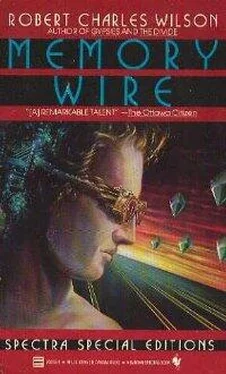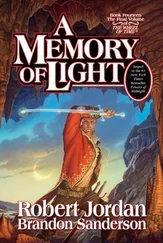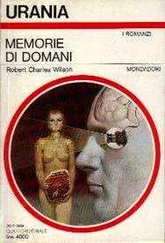Robert Wilson - Memory Wire
Здесь есть возможность читать онлайн «Robert Wilson - Memory Wire» весь текст электронной книги совершенно бесплатно (целиком полную версию без сокращений). В некоторых случаях можно слушать аудио, скачать через торрент в формате fb2 и присутствует краткое содержание. Год выпуска: 1987, ISBN: 1987, Издательство: Bantam Spectra, Жанр: Фантастика и фэнтези, на английском языке. Описание произведения, (предисловие) а так же отзывы посетителей доступны на портале библиотеки ЛибКат.
- Название:Memory Wire
- Автор:
- Издательство:Bantam Spectra
- Жанр:
- Год:1987
- ISBN:978-0-553-26853-9
- Рейтинг книги:4 / 5. Голосов: 1
-
Избранное:Добавить в избранное
- Отзывы:
-
Ваша оценка:
- 80
- 1
- 2
- 3
- 4
- 5
Memory Wire: краткое содержание, описание и аннотация
Предлагаем к чтению аннотацию, описание, краткое содержание или предисловие (зависит от того, что написал сам автор книги «Memory Wire»). Если вы не нашли необходимую информацию о книге — напишите в комментариях, мы постараемся отыскать её.
Memory Wire — читать онлайн бесплатно полную книгу (весь текст) целиком
Ниже представлен текст книги, разбитый по страницам. Система сохранения места последней прочитанной страницы, позволяет с удобством читать онлайн бесплатно книгу «Memory Wire», без необходимости каждый раз заново искать на чём Вы остановились. Поставьте закладку, и сможете в любой момент перейти на страницу, на которой закончили чтение.
Интервал:
Закладка:
The dreamstone. This well of memories.
She glanced back at the gunman, Oberg. He made an impatient hurry-up gesture.
She reached into the drawer. For one timeless moment she envisioned a scenario in which she would give the stone to Oberg, Oberg would take it, would leave them alive, and she would be better without it, after all, free from the yoke of remembering, free to inhabit the opaque but comfortable womb of her enkephalin addiction: she dreamed it would happen, that Oberg would allow them to live.
Knowing at the same time it was impossible. Oberg was Death; he looked like Death and he smelled like Death. He would kill the three of them. It was inevitable.
Pick it up. The voice was more insistent now, a clamoring.
Well, Teresa thought. It was the girl who wanted to live. Who cared. Not me. Never me.
Picking it up, she held it at first by its binding; but the ancient oilcloth unraveled and the naked stone fell back into the drawer. She reached for it instinctively.
The power of it throbbed in her arm as she turned.
CHAPTER 27
Keller had tied a handkerchief around his throat to conceal the bleeding, but by the time he reached the Floats the handkerchief itself was sodden with blood.
He was conscious of the time that had passed. He had walked for what seemed like miles along the verge of the road, across the oil barrens to a tiny Hispanic neighborhood, an all-night bodega from which he could phone for a taxi. He was filthy, his clothes were torn, he was bleeding: he had to offer up credit and ID before the cabbie agreed to open his door. Climbing out, he left bloodstains on the seat.
In the Floats he had lost himself twice—wandering too far down a darkened canal, past the yellow lights of empty cafes and market boats creaking in the midnight swell— crazed with fatigue and with this unrelenting sense of urgency. A cold salt wind sluiced through his clothes. Lost, he had to retrace his steps until he recognized a pontoon walkway or canal intersection and could correct himself, march on, while the stars wheeled overhead like the advancing hands of a clock. Time, he thought. But maybe time enough still to save her.
Then, at last, he identified the feeder canal that ran past the float shack Byron had rented. It was an old, narrow commercial right-of-way; fenced water, shanties pressing up against it, defined with chain-link and barbed wire fences and salt-emblazoned concrete risers. A boardwalk followed the canal along the mainland side, giving access to a row of shanties of which Byron’s was one: one of the few still showing lights at this hour. Everything dark, everything quiet. Rooftop windmills moaned in the fitful breeze from the tidal dam.
Fatigued beyond words, but careful now, Keller moved silently down the boardwalk.
The door was ajar.
He worked to steady his breathing. He was no longer in the state of heightened sensitivity Oberg’s counterfeit joychip had created, but he was in great pain. The wound he had hacked into his neck and shoulders was deep and had bled profusely. It was possible he could pass out at any moment… but only a little longer now, he told himself. Only a little longer.
Oberg was inside the door.
He shuddered, recognizing the angle of Oberg’s body, seeing the gun in Oberg’s hand. Here—from this edge of the boardwalk, a low wire fence behind him and the bulk of a concrete pillar—he was able to see Oberg and, beyond Oberg, the small table at which Byron and Cruz Wexler sat motionless. He couldn’t see Teresa. But, he thought dizzily, that doesn’t mean she’s dead. She might still be alive.
It was necessary to believe that.
He realized with a dawning incredulity that he had no weapon, no means of threatening Oberg. Not even a pocket knife. He was helpless here. He had come all this way, but too late. It was almost funny. He was tempted to laugh.
Instead he calculated the angle of that half-open door, the chance that he might manage to throw himself into it, topple Oberg, make it possible for Byron or Wexler to do something. Small, pathetic hope. But, hoping, he drew a deep breath and stepped forward.
But a dew had condensed on the mossy, ancient wood of the boardwalk, and he was massively fatigued; his foot slipped forward, his knee buckled.
He caught himself crouching, eyes on the doorway, but the slap of his palms on the wet wood was explosive in the night, and he watched helplessly as Oberg turned, the gun pivoting in his hand.
Wexler stood up as Oberg wheeled around.
He surprised himself. He had not contemplated this. There was no heroism in him, only this crippling fear. And yet here he was in motion. His body rebelling against his helplessness.
Standing, he did not hesitate. He upturned the flimsy wooden table and was aware of it tumbling forward. Byron looked at him, agape. A pain stabbed through his chest; his body screamed out for air. But he was able, for the moment, to ignore it.
He moved toward Oberg.
Oberg recoiled from the door. His impassiveness had failed him; he seemed startled and, briefly, frightened. The angle of the gun dropped. He blinked as the table thundered against the floor.
Wexler was moving now with some speed. His momentum carried him toward Oberg. He had forgotten everything but this mad rush forward, arms open in embrace. He was dimly aware of Byron coming to his feet, of Teresa’s movement in the back room, but these were distractions: his attention was devoted entirely to Oberg.
Oberg backed against the wall. Something changed in his face then: a settling, a hardening. He brought up the pistol in a swift motion.
Too late, Wexler thought. One of us is too late.
The gunshot was explosive in this tiny space.
The pain and the impact pushed him backward.
Keller burst through the door— if someone is hurting, you help —but was brought up short by the sight of Wexler bloody on the floor. He looked at Oberg, and Oberg was smiling absentmindedly; the gun was aimed at Keller.
“Christ,” Byron said. “Oh, Christ.”
Keller slumped against the wall. The world had come down to this man, this gun, and there was no way around it now, no exit from it. He closed his eyes briefly.
When he opened them again he saw Teresa: she was moving toward Oberg, and the stone was in her hand.
CHAPTER 28
Lost between worlds, between the drone of the enkephalins and the electricity of the dreamstone, Teresa opened her eyes.
She saw Byron’s float shack. She recalled a similar shack, a long time ago. The man in the next room was named Oberg. The man in the next room might have been named Carlos.
She held the stone in her hand.
And if I look in the mirror, she thought giddily, I’ll see the shoes bound with dirty twine, the old denim open at the knees. It was the thing she had resisted, the thing she had feared, the vision that had haunted her since that day in the hotel room off the Ver-o-Peso.
She would fall into the mirror, tumble into history, turn back into herself.
The voice of the girl was inside her now, louder and more insistent than it had ever been. The voice was warning her that she would die, that the man with the gun would kill her, that she had to do something, do something now.
It was the voice that had sustained her through the fire, buoyed her up when she wanted to die, when she knew she deserved to die.
But death was not so tractable. Death had finally come to finish what he had begun. It was only an appointment she had missed a long time ago. She had been expecting it and maybe even—it was possible to admit this now—maybe even wanting it, wanting it for years. Searching for it in pill bottles, the peace of it, an end at last to this quarreling with herself…
Читать дальшеИнтервал:
Закладка:
Похожие книги на «Memory Wire»
Представляем Вашему вниманию похожие книги на «Memory Wire» списком для выбора. Мы отобрали схожую по названию и смыслу литературу в надежде предоставить читателям больше вариантов отыскать новые, интересные, ещё непрочитанные произведения.
Обсуждение, отзывы о книге «Memory Wire» и просто собственные мнения читателей. Оставьте ваши комментарии, напишите, что Вы думаете о произведении, его смысле или главных героях. Укажите что конкретно понравилось, а что нет, и почему Вы так считаете.












